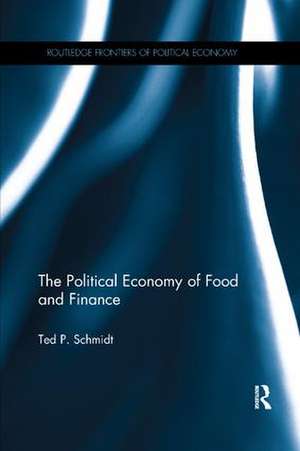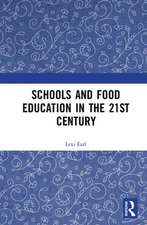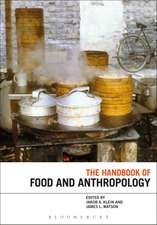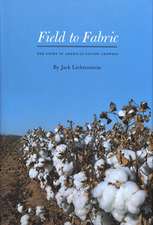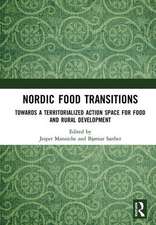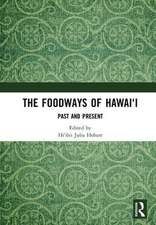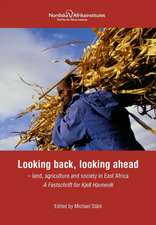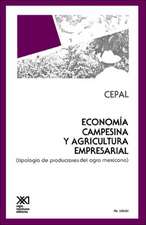The Political Economy of Food and Finance: Routledge Frontiers of Political Economy
Autor Ted P. Schmidten Limba Engleză Paperback – 16 iun 2017
This book describes the financialization process in commodity futures markets which transformed commodities into an asset class. Incorporated into the portfolio decisions of investors, commodity prices now behave like all asset prices, becoming more volatile and subject to periodic bubbles. As commodity prices were driven higher in the 2000s, farmland became more valuable, setting off a global land grab by investors, nations, and corporations. More recently, under the financialization food regime, slow growth and low returns encouraged merger activity driven by private equity firms, with food industry corporations as prime targets, leading to increased industry concentration.
With government policy focused on supporting corporate interests, there has been a global reaction to the current food system. The food sovereignty movement is taking on the interests behind the global land grab, and the regional food movement in cities across the U.S. is hitting corporations at the bottom line. Food corporations are listening. Is the food movement winning?
This book is of interest to those who study political economy, financialization and agriculture and related studies, as well as food systems and commodity future markets.
| Toate formatele și edițiile | Preț | Express |
|---|---|---|
| Paperback (1) | 444.19 lei 6-8 săpt. | |
| Taylor & Francis – 16 iun 2017 | 444.19 lei 6-8 săpt. | |
| Hardback (1) | 1162.71 lei 6-8 săpt. | |
| Taylor & Francis – 26 noi 2015 | 1162.71 lei 6-8 săpt. |
Din seria Routledge Frontiers of Political Economy
-
 Preț: 309.90 lei
Preț: 309.90 lei -
 Preț: 309.79 lei
Preț: 309.79 lei -
 Preț: 316.03 lei
Preț: 316.03 lei -
 Preț: 310.95 lei
Preț: 310.95 lei - 9%
 Preț: 866.82 lei
Preț: 866.82 lei -
 Preț: 309.12 lei
Preț: 309.12 lei -
 Preț: 311.61 lei
Preț: 311.61 lei -
 Preț: 286.99 lei
Preț: 286.99 lei -
 Preț: 327.83 lei
Preț: 327.83 lei -
 Preț: 311.87 lei
Preț: 311.87 lei -
 Preț: 302.76 lei
Preț: 302.76 lei - 9%
 Preț: 938.48 lei
Preț: 938.48 lei -
 Preț: 152.67 lei
Preț: 152.67 lei -
 Preț: 151.97 lei
Preț: 151.97 lei -
 Preț: 318.54 lei
Preț: 318.54 lei -
 Preț: 317.95 lei
Preț: 317.95 lei -
 Preț: 310.01 lei
Preț: 310.01 lei -
 Preț: 326.49 lei
Preț: 326.49 lei -
 Preț: 155.44 lei
Preț: 155.44 lei -
 Preț: 309.79 lei
Preț: 309.79 lei -
 Preț: 328.76 lei
Preț: 328.76 lei -
 Preț: 281.72 lei
Preț: 281.72 lei -
 Preț: 286.58 lei
Preț: 286.58 lei -
 Preț: 386.12 lei
Preț: 386.12 lei -
 Preț: 353.78 lei
Preț: 353.78 lei -
 Preț: 325.09 lei
Preț: 325.09 lei -
 Preț: 310.55 lei
Preț: 310.55 lei -
 Preț: 371.95 lei
Preț: 371.95 lei -
 Preț: 324.87 lei
Preț: 324.87 lei -
 Preț: 312.86 lei
Preț: 312.86 lei -
 Preț: 374.16 lei
Preț: 374.16 lei -
 Preț: 329.09 lei
Preț: 329.09 lei -
 Preț: 348.22 lei
Preț: 348.22 lei - 28%
 Preț: 1047.06 lei
Preț: 1047.06 lei - 18%
 Preț: 1169.45 lei
Preț: 1169.45 lei - 18%
 Preț: 1555.17 lei
Preț: 1555.17 lei - 18%
 Preț: 1048.43 lei
Preț: 1048.43 lei - 18%
 Preț: 1059.84 lei
Preț: 1059.84 lei - 31%
 Preț: 767.47 lei
Preț: 767.47 lei - 18%
 Preț: 731.92 lei
Preț: 731.92 lei - 26%
 Preț: 822.54 lei
Preț: 822.54 lei - 18%
 Preț: 1796.21 lei
Preț: 1796.21 lei - 26%
 Preț: 1184.91 lei
Preț: 1184.91 lei - 18%
 Preț: 1120.23 lei
Preț: 1120.23 lei - 15%
 Preț: 700.95 lei
Preț: 700.95 lei - 18%
 Preț: 1116.31 lei
Preț: 1116.31 lei - 22%
 Preț: 299.52 lei
Preț: 299.52 lei
Preț: 444.19 lei
Nou
Puncte Express: 666
Preț estimativ în valută:
85.01€ • 88.42$ • 70.18£
85.01€ • 88.42$ • 70.18£
Carte tipărită la comandă
Livrare economică 15-29 aprilie
Preluare comenzi: 021 569.72.76
Specificații
ISBN-13: 9781138299375
ISBN-10: 1138299375
Pagini: 176
Ilustrații: 24 Line drawings, black and white; 7 Tables, black and white; 24 Illustrations, black and white
Dimensiuni: 156 x 234 x 10 mm
Greutate: 0.33 kg
Ediția:1
Editura: Taylor & Francis
Colecția Routledge
Seria Routledge Frontiers of Political Economy
Locul publicării:Oxford, United Kingdom
ISBN-10: 1138299375
Pagini: 176
Ilustrații: 24 Line drawings, black and white; 7 Tables, black and white; 24 Illustrations, black and white
Dimensiuni: 156 x 234 x 10 mm
Greutate: 0.33 kg
Ediția:1
Editura: Taylor & Francis
Colecția Routledge
Seria Routledge Frontiers of Political Economy
Locul publicării:Oxford, United Kingdom
Public țintă
Postgraduate and UndergraduateCuprins
1. Introduction: Food and Finance 2. Financialization: There and Back Again 3. Setting the Table 4. The Financialization Process in Commodity Futures Markets 5. The Speculation Debate 6. Private Equity Bought the Farm: The Impact of Financialization 7. Food and Finance Policy 8. The Global Food Chain Reaction
Descriere
This book describes the financialization process in commodity futures markets which transformed commodities into an asset class. Incorporated into the portfolio decisions of investors, commodity prices now behave like all asset prices, becoming more volatile and subject to periodic bubbles. As commodity prices were driven higher in the 2000s, farmland became more valuable, setting off a global land grab by investors, nations, and corporations. More recently, under the financialization food regime, slow growth and low returns encouraged merger activity driven by private equity firms, with food industry corporations as prime targets, leading to increased industry concentration.
